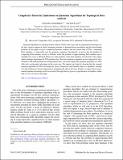Complexity-Theoretic Limitations on Quantum Algorithms for Topological Data Analysis
Author(s)
Schmidhuber, Alexander; Lloyd, Seth
DownloadPRXQuantum.4.040349.pdf (1.061Mb)
Publisher with Creative Commons License
Publisher with Creative Commons License
Creative Commons Attribution
Terms of use
Metadata
Show full item recordAbstract
Quantum algorithms for topological data analysis (TDA) seem to provide an exponential advantage over the best classical approach while remaining immune to dequantization procedures and the data-loading problem. In this paper, we give complexity-theoretic evidence that the central task of TDA—estimating Betti numbers—is intractable even for quantum computers. Specifically, we prove that the problem of computing Betti numbers exactly is #P-hard, while the problem of approximating Betti numbers up to multiplicative error is NP-hard. Moreover, both problems retain their hardness if restricted to the regime where quantum algorithms for TDA perform best. Because quantum computers are not expected to solve #P-hard or NP-hard problems in subexponential time, our results imply that quantum algorithms for TDA offer only a polynomial advantage in the worst case. We support our claim by showing that the seminal quantum algorithm for TDA developed by Lloyd, Garnerone, and Zanardi achieves a quadratic speedup over the best-known classical approach in asymptotically almost all cases. Finally, we argue that an exponential quantum advantage can be recovered if the input data is given as a specification of simplices rather than as a list of vertices and edges.
Date issued
2023-12-28Department
Massachusetts Institute of Technology. Center for Theoretical Physics; Massachusetts Institute of Technology. Department of Mechanical EngineeringJournal
PRX Quantum
Publisher
American Physical Society
Citation
Schmidhuber, Alexander and Lloyd, Seth. 2023. "Complexity-Theoretic Limitations on Quantum Algorithms for Topological Data Analysis." PRX Quantum, 4 (4).
Version: Final published version
ISSN
2691-3399
Keywords
General Physics and Astronomy, Mathematical Physics, Applied Mathematics, Electronic, Optical and Magnetic Materials, Electrical and Electronic Engineering, General Computer Science